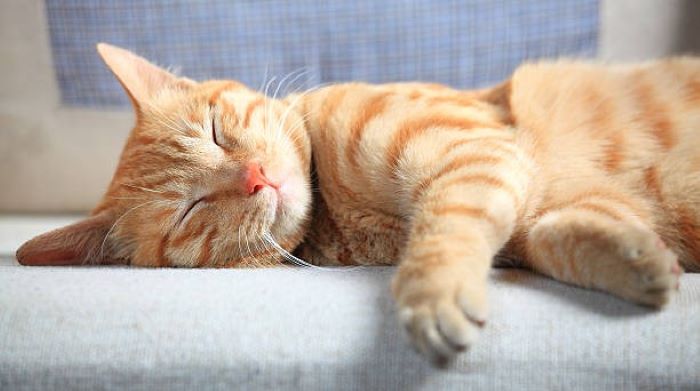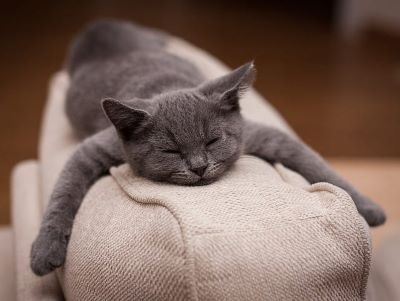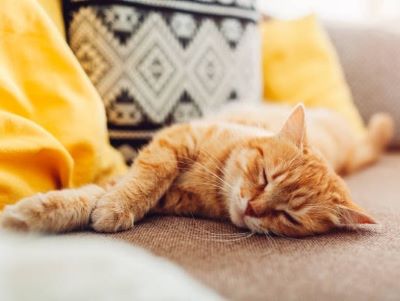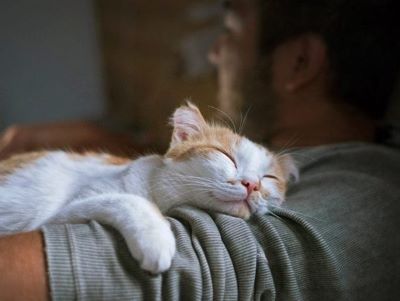Cats, those enigmatic and graceful creatures, have captivated our hearts with their unique behaviors.
One particular trait that often leaves us in awe is their sleep. Do you know cats sleep more than half of their lives?

That is correct, your cat may spend more time dozing off than anything else. But why do cats sleep so much, how does their sleeping pattern differ from us humans?
In this article, we will explore the fascinating slumberland of cats, and how to ensure healthy sleep patterns for your feline friend.
How Many Hours a Day Does a Cat Sleep?
When it comes to sleep, cats take the crown. On average, adult cats sleep for an astonishing 12 to 16 hours a day!
According to the study at PubMed, “If an animal is nocturnal, they sleep throughout the day and are primarily active during the night. Humans are the opposite of nocturnal—they are diurnal. This means they sleep at night, and their prime time for activities is during the day”
“Cats fall into a third category known as crepuscular. This term categorizes animals that are most active during dawn and dusk”
“Cats have different sleep-wake cycles than other animals and are often busy at night. This is because cats are crepuscular, which means they hunt and are active in the evening or early morning“, confirms Vanesa Farmer, DVM from WebMD.
However, it’s essential to note that sleep patterns can vary depending on age, with kittens and senior cats needing even more sleep to fuel their growing bodies or replenish their aging systems.

Cats follow a distinct sleep cycle akin to our own, consisting of various stages. This slumber adventure begins with a period of light sleep, where their whiskers twitch, paws twitch, and ears rotate like radars, ever alert to the surrounding environment.
Then, they dive into a deep sleep, characterized by complete relaxation and an absence of movement. It’s during this stage that dreams and rapid eye movements (REM) occur, just like in humans.
Sleeping Cycle of Cats
Cats have their own unique sleep cycle, which can be divided into four main periods: napping, evening playfulness, deep sleep, and morning playtime. Here’s a simpler explanation of what each period entails:
- Naps: Throughout the day, you might find your cat taking short 15-20 minute catnaps, with her paws tucked under her body. She’s resting and can quickly wake up if needed. Sometimes, she may enter a brief period of deep sleep during this time.
- Evening Playfulness: As night falls, your energetic cat may become more active. This is influenced by her natural hunting instincts. She might engage in playful running and jumping, mimicking a hunt.
- Deep Sleep: Just like humans, cats experience deep REM sleep. This usually occurs after they’ve satisfied their hunting instincts at night. During deep sleep, you might notice your cat sprawled out and less likely to wake up or pounce.
- Morning Playtime: The morning is another active time for cats. They may exhibit playful behavior, such as running around or begging for breakfast. After their “hunt,” they will begin a cycle of daytime catnaps until the next active period.
In simple terms, cats take short naps during the day, get active in the evening, have a deep sleep phase, and then become lively again in the morning.
Why Do Cats Sleep So Much?
Cats are both intuitive and sensitive creatures, and their sleep patterns can be influenced by many factors.
In 24 hours cats sleep for almost 15 hours per day, but why do they sleep so much? There can be many reasons for that so here are some of them[1]:
1. Health and Age
Health and age-related factors are crucial considerations as well.
Illnesses, pain, or discomfort can disrupt a cat’s sleep routine. Senior cats, just like elderly humans, tend to require more sleep as their bodies age and their energy levels decrease.
Providing a stress-free environment and regular veterinary check-ups can help address any underlying issues and ensure your cat enjoys uninterrupted sleep.

2. Natural Hunting Instincts
A tired cat with no energy can’t hunt or protect themselves, so it’s important for them to sleep lots to make sure they’re wide awake and ready for anything!
Researchers hypothesize that a cat’s crepuscular sleep cycle is driven by its predatory nature. Common prey animals for cats have different sleep cycles[2].
A cat’s crepuscular nature allows it to be awake at daybreak to prey on diurnal birds, and at twilight to prey on nocturnal rodents.
3. Environment
Environmental factors also affect the quality and duration of cat sleep.
Creating a peaceful and comfortable sleeping environment, complete with cozy beds, quiet spaces, and a suitable temperature, can enhance their slumber.
Cats are known to be sensitive to disturbances, so minimizing noise and disruptions is essential for their restful sleep.
4. Boredom
If your cat sleeps too much, she might be bored with her indoor environment.
You can make it more stimulating for her by adding cat trees, window perches, and engaging toys.
Otherwise, your cat may show signs of boredom such as yowling, meowing, night calling, lack of interest, anxiety, overeating, mischief, or behavioral issues with other pets.
Should You Be Concerned About Your Cat’s Sleep?
While it is normal for cats to sleep for extended periods, it’s always important to be observant of your cat’s behavior and habits.
If you notice a sudden and significant change in your cat’s sleeping patterns, it might be worth monitoring further. Here are a few situations where you might want to be concerned about your cat’s sleep:
- Excessive Sleep: If your cat is sleeping significantly more than usual or appears excessively lethargic, it could be a sign of an underlying health issue.
- Difficulty sleeping: If your cat seems to have trouble settling down, experiences restlessness during sleep, or displays signs of discomfort, it could indicate an underlying medical condition or pain.
- Abrupt Changes in Sleep Patterns: Cats are creatures of habit, and sudden changes in their sleep routine can be a cause for concern. If your cat’s sleep patterns drastically shift without any apparent reason, it may be worth investigating to determine if there are any underlying issues that need attention.
- Excessive Daytime Sleepiness: Cats are generally more active during nighttime, but they should still have periods of wakefulness during the day. If your cat appears excessively sleepy during the daytime and shows a lack of interest in activities, it might be worth consulting a vet.

It’s important to remember that every cat is unique, and individual variations in sleep patterns can occur. If you have any concerns about your cat’s sleep, behavior, or overall health, it’s always best to consult with a vet for professional guidance and advice.
FAQs
How Long Do Cats Sleep in 24 Hours?
How Many Hours a Day Do Cats Sleep? More than half of cats sleep between 12 and 18 hours a day. View Source and nearly 40% of cats sleep more than 18 hours per day. As they grow older, a majority of cats sleep for more hours each day than they did in their younger years.
Is It Normal for Cats to Sleep All Day?
Cats, unlike us, seem to know that sleep is inherently valuable and invest the time to recharge. Your cat might not be sleeping too much; you might be sleeping too little! Sleeping and resting up to 20 hours a day is normal for your cat. If he is feeling well, his life is enriched, and he is healthy, just go with it.
Why Do Cats Sleep at Your Feet?
Feet often emit heat, and cats may find the warmth comforting and soothing. On the other hand, if your cat sleeps at the edge of the bed, but away from your feet, it’s likely they’re seeking a cooler spot to rest. Cats will find places that allow them to maintain an optimum body temperature for sleeping.
Why Do Cats Sleep With You?
Strengthens the bond – Cats who sleep with their humans are closer to them. This comfortable snuggle helps them feel more trust and safety with their owners. It’s warm – For those who get cold easily, a cat in the bed is the perfect feet warmer.
Why Does My Cat Sleep Next to Me?
Sleeping next to you helps them feel more secure in their ability to sleep because they know they have an extra layer of defense if a predator comes their way. This is especially important to your cat when it’s dark, which is why you may wake up to find your cat curled up against you in the middle of the night.
Why Does My Cat Sleep on Me?
When your cat chooses to sleep on you, it’s her way of saying “I love you. I want to be near you and spend time with you when I’m at my most vulnerable.”
How Many Hours a Day Do Cats Sleep?
More than half of cats sleep between 12 and 18 hours a day. Nearly 40% of cats sleep more than 18 hours per day. As they grow older, a majority of cats sleep for more hours each day than they did in their younger years.
Take Away
With impressive sleep durations and unique sleep cycles, cats possess a captivating sleep routine that sets them apart.
By understanding and respecting their sleep needs, providing them with a serene sleeping sanctuary, and addressing any health concerns, we can contribute to their overall well-being and health.
So, the next time you find your cat curled up in a cozy corner, purring gently in their slumber, appreciate the beauty of their restful moments.
Reference:
- Mph, N. L. L. B. (2023, March 17). Why Do Cats Sleep So Much?– PetMD.
- Shoen, S., & Shoen, S. (2022, April 20). How Many Hours Do Cats Sleep?– Sleep Foundation.

